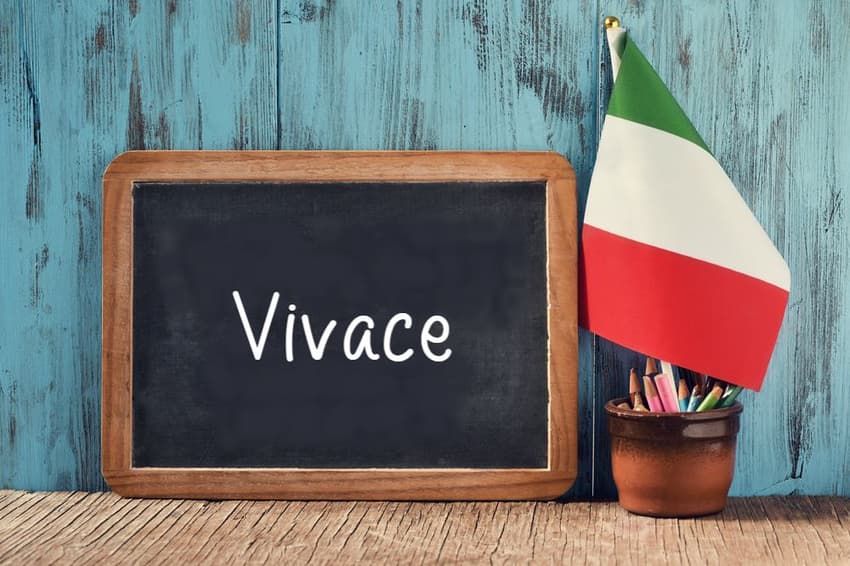
Italian word of the day: 'Vivace'

You can use this word to describe people or wine, and it's always a good one to know.
As the weekend is here, let’s talk about an adjective that we can use to describe both our favourite people and our favourite wines.
Of all the words Italian bartenders might employ when describing wine (and there are so many), vivace is my personal favourite, because to my mind it says the wine is so vivacious it’s almost alive.
I probably don’t even need to translate it, but vivace is an adjective that means lively, vibrant or spirited.
Slightly trickier may be the pronunciation. Because in Italian a c followed by and e or I becomes a “ch” sound, you’d pronounce it vih-vah-cheh. With stress on the second syllable.
Being a recent convert to Lambrusco (The one you can buy in Emilia-Romagna. It’s so much better than you’re thinking, I swear.) and also being a nerd, I was excited to spot this word in a New York Times article about Lambrusco and its, er, international reputation. Which is apparently improving.
“Lambrusco is just one of a handful of reds in Italy that are called vivace, or lightly sparkling,” it said.
It's important for wine lovers to know that the word describes a particular degree of fizziness - less than the more commonly-heard frizzante.
An Italian wine website meanwhile describes the wine as vivace, frizzante e conviviale, or “Lively, sparkling and convivial,” which makes it sound more like a flamboyant party host than a drink.
Obviously, you can also use vivace to talk about particularly energetic people, usually children, or flamboyant party hosts, or that one friend who always gets really overenthusiastic about unexpected things.
Un bambino allegro e vivace
A happy and lively child
Vostra figlia ha una danza vivace.
Your daughter is a spirited dancer.
And just like the English translation, it can be used to describe all sorts of other things, too.
Era una vivace discussione
It was a lively discussion
Da quando è arrivata la casa è molto più vivace.
The house is much livelier since she got here.
When used to describe colour, it means bright or vibrant.
Ha un abito di un rosso vivace
She has a bright red dress
You might also say someone has a mente vivace (active mind) or ingegno vivace (quick wit)
So whether you’re going out for drinks with your most talkative friend this weekend, or staying home with a couple of energetic kids, we hope this word is a useful one.
Do you have a favourite Italian word you'd like us to feature? If so, please email our editor Jessica Phelan with your suggestion.
Comments
See Also
As the weekend is here, let’s talk about an adjective that we can use to describe both our favourite people and our favourite wines.
Of all the words Italian bartenders might employ when describing wine (and there are so many), vivace is my personal favourite, because to my mind it says the wine is so vivacious it’s almost alive.
I probably don’t even need to translate it, but vivace is an adjective that means lively, vibrant or spirited.
Slightly trickier may be the pronunciation. Because in Italian a c followed by and e or I becomes a “ch” sound, you’d pronounce it vih-vah-cheh. With stress on the second syllable.
Being a recent convert to Lambrusco (The one you can buy in Emilia-Romagna. It’s so much better than you’re thinking, I swear.) and also being a nerd, I was excited to spot this word in a New York Times article about Lambrusco and its, er, international reputation. Which is apparently improving.
“Lambrusco is just one of a handful of reds in Italy that are called vivace, or lightly sparkling,” it said.
It's important for wine lovers to know that the word describes a particular degree of fizziness - less than the more commonly-heard frizzante.
An Italian wine website meanwhile describes the wine as vivace, frizzante e conviviale, or “Lively, sparkling and convivial,” which makes it sound more like a flamboyant party host than a drink.
Obviously, you can also use vivace to talk about particularly energetic people, usually children, or flamboyant party hosts, or that one friend who always gets really overenthusiastic about unexpected things.
Un bambino allegro e vivace
A happy and lively child
Vostra figlia ha una danza vivace.
Your daughter is a spirited dancer.
And just like the English translation, it can be used to describe all sorts of other things, too.
Era una vivace discussione
It was a lively discussion
Da quando è arrivata la casa è molto più vivace.
The house is much livelier since she got here.
When used to describe colour, it means bright or vibrant.
Ha un abito di un rosso vivace
She has a bright red dress
You might also say someone has a mente vivace (active mind) or ingegno vivace (quick wit)
So whether you’re going out for drinks with your most talkative friend this weekend, or staying home with a couple of energetic kids, we hope this word is a useful one.
Do you have a favourite Italian word you'd like us to feature? If so, please email our editor Jessica Phelan with your suggestion.
Join the conversation in our comments section below. Share your own views and experience and if you have a question or suggestion for our journalists then email us at [email protected].
Please keep comments civil, constructive and on topic – and make sure to read our terms of use before getting involved.
Please log in here to leave a comment.